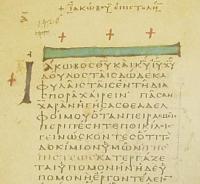"The Law of Liberty" -- James 1:19-37
 Wednesday, May 6, 2009 at 09:14AM
Wednesday, May 6, 2009 at 09:14AM  The Third in a Series of Sermons on the Book of James
The Third in a Series of Sermons on the Book of James
In the most direct and pointed of terms, the Book of James exhorts Christians to do good works. According to James–the brother of Jesus–God is the giver of every good and perfect gift. One of these good and perfect gifts is the fact that God has brought us forth from death to life through the means of his word (the preaching of the gospel). But James goes on to point out that since believers have been brought to life through the preached word, believers are therefore to obey that same word which has given them life. James directs us not only to hear the word, but do the word, which simply means that we are to obey the commandments given by God to his people. We are to do this not to become Christians, but because we already are Christians. We will obey the commandments of God as revealed in the perfect law of liberty, because God has given us a living faith, which not only hears, but does.
As we continue our series on the Book of James, we now move into the last half of the first chapter (verses 19-27). In these verses, James makes the point that those who have been brought forth by God, need to obey the word which has given them life. To put it yet another way, true, genuine, saving faith, necessarily leads to the production of good works. The relationship between the new birth and good works–an important theme in the Book of James—is an essential aspect of Christian doctrine. But this is also a topic about which many Christians are woefully confused. So we’ll begin by taking up the subject of the relationship between regeneration and good works as the means to prepare us to make our way through verses 19-27 of the first chapter of James, where persecuted Jewish Christians are exhorted by James to be doers of the word and not mere hearers only.
I have been attempting to make the case that the proper way to interpret the Book of James is to place this book in its historical context. With this book, context is everything. If you were not here for the first sermon in this series, I would strongly encourage you to pick up a copy from the bookstore. I have been arguing that James was quite likely the first book written in our New Testament, and that this epistle was written at some point in the mid 40's of the first century. As we saw last time, the original audience was persecuted Jewish Christians who were scattered throughout Palestine. Written before the controversy over justification broke out between Jewish and Gentile Christians in Asia Minor in A.D. 48, James is writing to exhort Jewish believers to live in a manner which is consistent with their profession of faith.
To read the rest of this sermon, click here



Reader Comments